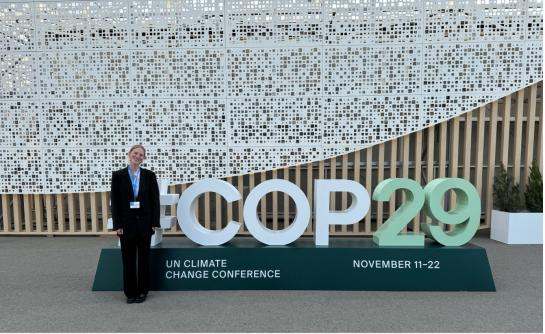COP29 REFLECTIONS ON ARTICLE 6.4 AND THE INCLUSION OF INDIGENOUS PEOPLES IN CARBON MARKETS
Xanne Bekaert, PhD Researcher and Teaching Assistant at the Department of Public Law, had the unique opportunity to attend COP29 in Baku, Azerbaijan, as part of the Belgian delegation. This experience allowed her to delve into the evolving landscape of carbon markets under Article 6.4 of the Paris Agreement, in line with her PhD research on the impact of carbon market initiatives on the rights of Indigenous communities. Below, she shares her insights and reflections on the key discussions held at COP29.
An historic opportunity, but challenges ahead
Attending COP29 offered me a unique perspective on the evolving landscape of carbon markets under Article 6.4 of the Paris Agreement. While the Agreement aims to establish a high quality, high integrity carbon market, my experience highlighted significant gaps that could undermine its potential - particularly in the treatment of social integrity and the rights of IPs and LCs.
The adoption of article 6.4 standards: procedural concerns
Upon my arrival at COP29, I was struck by the contrasting dynamics surrounding the adoption of Article 6.4 and its safeguards. While the standards for the Sustainable Development Tool, designed to assess and monitor social and environmental impacts throughout a project's lifetime, were announced during the Pre-COP in Baku, the formal announcement of the adoption of Article 6.4 on Day 1 of COP29 revealed a more contentious process. The Article 6.4 Supervisory Body adopted two key standards on emissions reductions and carbon removal, bypassing the usual consensus-driven process. This move has been criticised for excluding key stakeholders, including IPs and LCs, from influencing standards that directly affect their rights and livelihoods.
While the Supervisory Body's decision was welcomed as a step towards operationalising a centralised carbon crediting mechanism under the Paris Agreement, it also revealed an imbalance. There was a strong focus on environmental integrity at the COP, but not enough emphasis on ensuring robust social safeguards. Although the Supervisory Body agreed earlier this year on a mechanism for affected communities to appeal decisions or file complaints, questions remain about how these rights will be implemented and enforced, especially in countries that do not legally recognise indigenous peoples' rights or adhere to international instruments such as UNDRIP.

The role of Indigenous Peoples: essential but overlooked
To succeed in the fight against climate change, we must recognise that the conservation of tropical forests and other critical ecosystems is impossible without the partnership and leadership of Indigenous Peoples and Local Communities. Their principles, culture, and traditional methods of land stewardship are invaluable assets in achieving shared conservation goals. Yet, the implementation of Article 6.4 raises significant questions about how these partnerships will be fostered.
Recognition of Indigenous Rights
The safeguards in Article 6.4, outlined in the Sustainable Development Tool, require activity participants to recognise Indigenous rights as defined in national laws and relevant international treaties. This framework intends to ensure that projects respect the collective rights of Indigenous Peoples to their land, resources, culture, and self-determination. However, the reality is more complex and concerning. Many countries either fail to legally recognise Indigenous Peoples or have not adopted key international instruments such as UNDRIP. This creates significant gaps in protection, particularly in contexts where national legislation does not adequately protect Indigenous rights. Reliance on host country laws leaves Indigenous Peoples vulnerable, especially in countries where their existence or land rights are not formally recognised. Without robust international enforcement or alignment with global standards, there is a risk that protections will become ineffective, leaving Indigenous communities at risk of exploitation or marginalisation.
Free, Prior, and Informed Consent (FPIC)
Although FPIC is prescribed by the Sustainable Development Tool, its implementation often lacks the rigour needed to ensure that indigenous voices are truly heard. Without stronger guarantees, there's a risk that carbon activities will proceed without genuine community consent, leading to conflict and undermining trust.
The gaps in implementation
The success or failure of Article 6.4 standards will depend on robust governance and enforcement mechanisms. Designated Operational Entities (DOEs) and the Supervisory Body must ensure strict compliance, but this is no small task.
Key challenges include:
- Governance structures: Without strong oversight, the risk of exploitation and rights violations remains high.
- Capacity building: Indigenous communities must have the tools and resources to actively participate in projects and negotiations.
- Equitable benefit sharing mechanisms: Benefits from carbon projects should be shared fairly, with Indigenous Peoples receiving a meaningful share for their contributions to climate resilience.
Positive steps and the path forward
Despite the challenges, there are encouraging signs of progress in ensuring greater inclusion of IPs and LCs in global climate action. A notable development at COP29 was the adoption of the Baku Workplan, which aims to elevate the voices of IPs and LCs in decision-making processes. This initiative reflects a growing recognition of their central role in climate solutions.
Recognising ancestral land rights could be another step towards inclusivity. By validating traditional claims to land and resources, this approach enables more equitable participation in carbon projects. Furthermore, the emphasis on working with indigenous peoples to integrate their knowledge systems into climate strategies demonstrates a shift towards integrating their invaluable contributions to climate resilience.
The Baku workplan serves as a framework for fostering partnerships with IPs and LCs, creating opportunities to ensure their leadership in both policy development and implementation. However, the success of such initiatives will depend on robust enforcement mechanisms, adequate capacity building and equitable sharing of benefits. By building on these positive steps, the global community can transform carbon markets into tools for both meaningful climate action and social equity.

Conclusion
To truly realise the potential of Article 6.4, social integrity must be at the heart of its implementation. This means ensuring that Indigenous Peoples are not just participants but central to decision-making processes, with their voices shaping outcomes that respect their rights, cultures, and knowledge. Achieving this requires embedding robust mechanisms for free, prior, and informed consent that go beyond formalities, guaranteeing genuine and meaningful participation. Moreover, equitable access to resources is essential to build the capacity of Indigenous Peoples, enabling them to engage fully and effectively in carbon market activities.
This is a critical moment to strengthen the role of carbon markets as tools for transformative change. These markets must prioritise social justice as well as environmental outcomes, bringing empowerment and resilience to the communities on the frontlines of climate change. By placing social integrity at the heart of carbon market initiatives, we can ensure they deliver on their promise of equitable and sustainable climate solutions.


Share this article